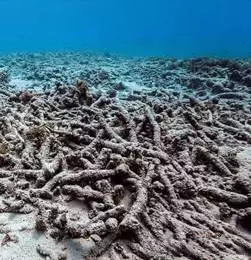Coral reefs around the world have suffered three years of coral bleaching after 30 years of record heat. It is now clear that coral reefs cannot survive under the influence of climate change. Their final state will depend not only on society's belief in restoring coral health, but also on the ability to sustain investment and actions that support this commitment.
Over the past 50 years, the warnings about anthropogenic climate change and the evidence for the impacts of global population increase, resource depletion and energy use have been largely ignored. During this period, local impacts were translated into global impacts. But in the past two years, world leaders have signed the Paris Agreement and adopted the UN's Sustainable Development Goals, marking a dramatic change. The Paris Agreement's global temperature rise of less than 2 degrees Celsius is the only chance for coral reefs to survive. If the protocol is fully implemented, temperatures will eventually drop, providing conditions for surviving reefs and reef rescues.

But while the Paris Agreement and the Environmental and Social SDGs build on existing conventions and commitments, the Economic SDGs run counter to mainstream trade, financial and corporate interests. Most businesses follow a linear rather than circular economy approach, and emissions (CO2 and other pollution) are the main driver behind the decline of coral reefs. Therefore, transforming the economic system to be sustainable and circular, such as the new EU policy, is a top priority, as this will minimise waste and align macroeconomic practices and policies with economic sustainability goals.
A necessary but insufficient step in driving this change is to measure the many benefits humans derive from coral reefs: coastal protection, food security, and the impoverishment of more than 500 million people. For tropical countries, coral reefs can be a major asset to the world's largest economic sector, tourism. These benefits are not officially recognized, so we pay only a fraction of the cost for the services we provide to the reef. Now is the time to invest in maintaining and restoring coral reefs as a major asset. Aligning financial instruments to support this investment is a crucial first step that will mark a shift in awareness of the value of coral reefs.
In addition, coral reef protection requires action on an unprecedented scale. In the tropics, grassroots and large-scale conservation efforts are aligning community interests, businesses and governments with reef health as an asset. These are long-term efforts, but they are always threatened by short-term commercial and political interests. Usually, the latter wins. Frontiers in research biology, such as accelerating genetic selection for heat-tolerant corals and exploring potential refuges in coral reef ecosystems, will hopefully lead to effective restoration options.
Support and expansion of conservation efforts are urgently needed in all ocean basins, but they may only be successful if temperatures stabilize with low greenhouse gas emissions. Two things will wipe out reefs' chances of survival: not dealing with non-climate pressures that erode reef resilience, and runaway warming of more than 2 degrees Celsius. If this happens, it is almost certain that major coral reef systems will not survive the Anthropocene.
The state of coral reefs in the coming years will be a clear indicator of our ability to change the policies and practices described above. These shifts will benefit the health and sustainability of the entire planet, so the benefits of collective action to save coral reefs will be shared across the planet.
This article is excerpted from Science magazine, published by David Obura on September 22, 2017